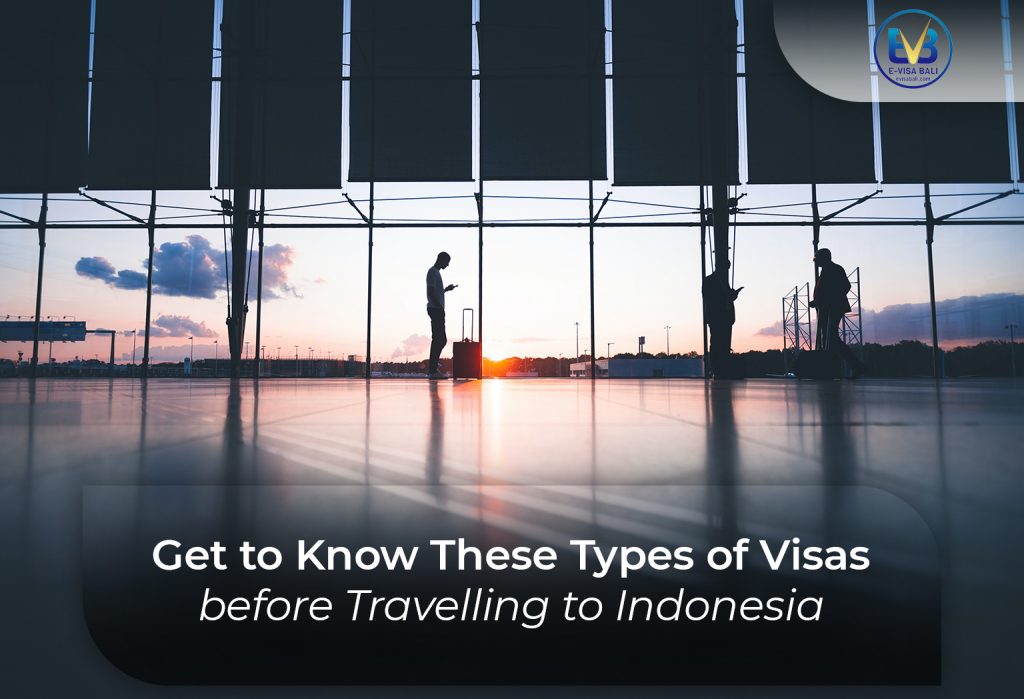Types of Visas before Travelling to Indonesia

Before visiting Indonesia, you need to determine one among many Indonesian visa types that suits your travel purpose. Each has their the requirements you should fulfill to receive the visa you are applying for. Do you know? In the meantime, considering the transmission of COVID-19, the Indonesian government has introduced an innovative digital solution to facilitate both domestic and foreign tourists for a convenient e-visa application system. Applying online visa allows the tourists for convenient access to prepare their travel to Indonesia from wherever they are now. You are always welcome to consult an expert if you found it hard to decide which type of visa is the most appropriate for your intended travel. Preventing Omicron has its toll in Indonesia, the country has to ban these 14 countries to hamper the spread, see more the latest news by Evisa Bali. Visa Definition and Types of Visas in Indonesia Visa is an official document that can be both manual and electronic, granted by the polity to allow entry, stay, and leave for the bearer in the Indonesian Territory. Generally, there are four types of visas in Indonesia according to Immigration Law. Those Indonesian visa types include: Diplomatic Visa Service Visa Visitor Visa Temporary Stay Visa We elaborated the conditions that distinguish the types of visas in the following, #1 Diplomatic Visa One of these Indonesian visa types grants the holder a diplomatic passport, including his family, to enter the Indonesian Territory to run his diplomatic assignments. There are three popular ways foreigners apply for visas in Indonesia before the pandemic and of course e-visa. Those are by the Indonesian Embassy or Consulate (before departure), at the Indonesian airport (on arrival), and delegating their time-consuming task to a visa service bureau. #2 Service Visa This visa grants the official passport bearer/Laissez-Passer United Nations, to travel to Indonesian Territory with his family and carry out non-diplomatic official services from a foreign or international organization in the country. The endorsement of both diplomatic and service visas is under the authority of the Minister of Foreign Affairs and in practice issued by foreign service officials at the Representatives of the Republic of Indonesia. #3 Visitor Visa It is a visa issued to foreign nationals who wish entry to Indonesia for purposes such as: Excursion and social visits Carrying out emergency duties Conducting a business talk Making a purchase of goods Part of the media, medical, and food service personnel Carrying out governmental affairs Joining a conveyance in Indonesian territory Making a visit for the marina industry development (yachters) Governmental affairs relating to the Indonesian Presidency in the G20 Humanitarian affairs Industrial visits Making a visit for documentary filmmaking Recommendation from Visitor visas can be identified into three categories, such as single-entry visa, multiple-entry visa, and visa on arrival. Both single-entry and multiple-entry visas allow you to stay in Indonesia for up to 60 days. However, the former indicates you can only get one-time permission to enter the country until the expiration of the visa. The latter gives you more flexibility in terms of the frequency of your entry to Indonesia in a range of 12 months. You can only remain in Indonesia for up to 30 days with a visa on arrival. Therefore, choose your Indonesian visa wisely before deciding. #4 Limited Stay Visa A foreign national is granted extendable permission to make Indonesia his second home with a maximum of 24 months. The purposes for a limited stay visa might include work, retirement, investment, research, sport, etc. Once the limited stay visa holder arrives, s/he can use it to apply for a temporary permit (KIMS/KITAS) for the latest of 30 days after the visa has been issued. Those Are 4 Types of Visas That You Need to Know Before Visiting Indonesia! We hope our article can give you a bigger picture regarding types of visas that might be the best fit for your visit to Indonesia. Remember to be a responsible visitor and of course, do not overstay your visa. To find out what will happen just in case you forgot to extend the visa in Indonesia, check out our What Happens If You Overstay Your Visa in Indonesia now!

